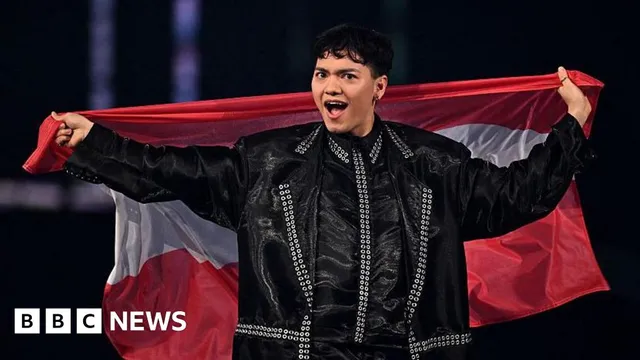
Austria triumphs at Eurovision 2025 with emotional performance
2025-05-18 16:02- Singer JJ's Wasted Love led Austria to victory at the Eurovision Song Contest 2025, showcasing a dramatic shipwreck theme during the performance.
- Israel's Yuval Raphael took second place while Estonia's Tommy Cash finished close behind in third.
- The event highlighted Eurovision's role as a celebration of diversity and love despite ongoing political tensions across Europe.
Express your sentiment!
Insights
In Switzerland, Austria celebrated a significant victory at the Eurovision Song Contest 2025, with singer JJ winning the contest on May 17, 2025. This marked Austria's third win in the event's history, the first since Conchita Wurst's triumph in 2014. JJ captivated audiences with his operatic pop anthem, Wasted Love, which resonated deeply with voters across the continent, culminating in a total of 436 points. The staging of his performance added to its impact, depicting a dramatic shipwreck theme that complemented his striking vocal delivery. Israel's Yuval Raphael, who performed New Day Will Rise, secured second place with 357 points, while Estonia's Tommy Cash finished closely behind in third with 356 points. The contest showcased a vivid array of performances from diverse contestants hailing from various countries, illustrating both traditional and contemporary influences in modern music. However, the event was not without incident, as tensions around political issues lingered; the participation of certain countries, including Israel, faced scrutiny due to ongoing geopolitical conflicts. JJ expressed gratitude for the audience's support and shared his personal touch with the song, which reflects on experience with unreciprocated love. During the event, excitement peaked as votes were tallied towards the end, with Austria's last-minute surge ultimately clinching the victory. Winners in the past have often made connections with the LGBTQ+ community, highlighting the importance of Eurovision not just as a music contest but also as a celebration of diversity. In recent years, the competition also faced challenges, particularly related to its political climate, impacting which countries could participate. The event featured performances that captured this emotional undercurrent, including tributes and messages about love and resilience amidst challenges. The acknowledgment of love as a transformative and powerful force resonated strongly during this year's performances, illustrating the deeper connections established through shared experiences in the face of adversity.
Contexts
The political controversies in Eurovision history have often overshadowed the musical aspects of the competition, creating a unique intersection between culture, national identity, and geopolitics. Since its inception in 1956, Eurovision has served not just as a platform for artistic expression, but also as a stage for political statements and rivalries. Various entries and performances have sparked heated debates, leading to boycotts, disqualifications, and a series of diplomatic rifts that have highlighted the underlying tensions between participating countries. For instance, the political context surrounding the 2003 contest in Riga was notably influenced by the ongoing conflict in Iraq, with some countries choosing to perform songs that reinterpreted their national identities in response to world events. This environment has led to the emergence of ‘political voting’ where countries often award points to neighbors or political allies rather than based purely on musical merit. One of the most significant events emerged during the 2009 Eurovision Song Contest held in Moscow, where the tension between Russia and Ukraine flared anew. Ukraine's entry, which referenced the political strife within the country, led to accusations of political bias and manipulation. The contest in Moscow became a flashpoint for showcasing the strained relationship between the two nations, with protests and public disputes dominating the headlines. Additionally, the inclusion of entries from countries with contentious political issues, such as Azerbaijan, has further complicated the narrative, as their contested human rights records are often called into question during the lead-up to the event. This reflects the ways in which Eurovision is both an entertainment spectacle and a platform for international debate about democracy and freedom of expression. The controversy surrounding the 2019 contest in Tel Aviv, Israel, also exemplifies the politically charged atmosphere of Eurovision. The event became a site for protests against Israeli policies towards Palestine, leading numerous artists and activists to call for a boycott of the competition. These political undertones raised questions about the role of cultural events in times of political unrest, and whether they should be used as platforms for protest or remain strictly apolitical. This led to discussions about the inclusion of marginalized voices and whether they can be effectively represented within the structures of a state-sponsored event like Eurovision that can be seen to endorse national narratives. Eurovision continues to evolve as it grapples with the intersection of music and politics. Recent years have seen countries increasingly use the platform to make powerful statements on social issues, including LGBTQ+ rights and migration crises, demonstrating that while the competition is rooted in celebrating musical talent, it cannot escape the political realities that shape our world. As it moves towards the future, Eurovision must navigate its identity amidst these ongoing challenges, balancing the celebration of diversity and artistry with the complex political landscapes of its participating nations. Thus, the political controversies in Eurovision history not only highlight the multifaceted nature of the contest but also underscore the importance of music as a medium for dialogue in an increasingly polarized world.